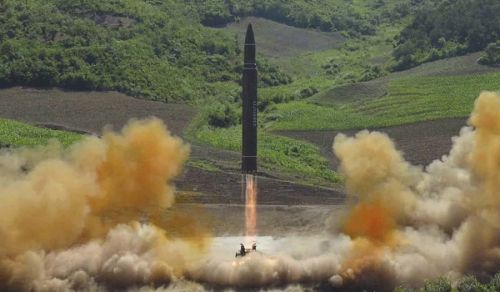
بسم الله الرحمن الرحيم
News & Comment
America’s Military Hijacks the Trump Administration and Pushes for War
News
This week US President Trump approved sanctions against Russia, Iran and North Korea. He said, “I favor tough measures to punish and deter bad behavior by the rogue regimes in Tehran and Pyongyang. I also support making clear that America will not tolerate interference in our democratic process, and that we will side with our allies and friends against Russian subversion and destabilization [1].”
Out of the three regimes targeted by US sanctions, those against North Korea seemed the most ominous. A view unanimously shared by the permanent members of the UN Security Council. This development coincides with Gen Kelly’s appointment as White House Chief of Staff and raises the specter of war on the Korean peninsula.
Comment
In the early days of the Trump administration, the President’s behaviour suggested warming of ties with Russia and cooling of relations with China. With the passage of time, however, Trump’s position hardened against Russia, and softened towards China. The media frenzy over Russian interference in the US presidential election and Trump’s outreach towards Beijing to rein in Pyongyang missile tests provided the backdrop to Trump’s abrupt about turn.
This proved rather short-lived. Successive missile tests by North Korea made clear to Trump that Beijing was either unable or unwilling to pressurize Pyongyang to give up its quest to possess credible missile technology, which could deliver a nuclear payload against US cities. To mitigate this threat, Trump reacted by deploying THAAD [2] in South Korea and assembling America’s navy close to Chinese shores.
Perturbed by THAAD’s ability to track intercontinental ballistic missiles and provide advance notice to America’s home defenses combined with America’s aggressive posture against North Korea have resulted in Russia and China accelerating preparations for war. China has buttressed its defenses along the border with North Korea, while Russia under the pretext of conducting military drills has deployed 100,000 troops close to the border with NATO countries.
Both measures have an offensive dimension and eerily resemble the events leading up to the Korean War in 1953. A war on the Korean peninsula could see Chinese and American troops fighting for territory across the 38th parallel [3], and may even lead to nuclear war. America preoccupation with China on the peninsula could see Russian intervention in Eastern Europe, especially Moscow’s desire to annex Ukraine.
Trump’s policy towards both Russia and China is no different to his predecessor’s policy of containing both powers. In fact, there is alarming similarity with the policies of Bush and Obama, the edifice of which is to restrict both countries from reasserting their dominance in Eurasia. The only difference is that America in the past was prepared to fight two simultaneous wars but the financial crises of 2008 and deep military cuts under Obama means that America’s war capability is limited to a single war that involves a great power.
Crucially there is one main difference between policies of previous US governments and the Trump administration that resonates above all else. This is the ascendency of the military establishment in Trump’s administration.
Gen. John Kelly is the White House Chief of Staff, Secretary of Defense is Gen. James Mattis, Gen McMaster is White House National Security Adviser and on Tuesday, Attorney General Jeff Sessions named Gen. Mark S. Inch as the director of the Federal Bureau of Prisons (BOP).
The Generals now dominate policymaking and policy execution. Traditionally in American foreign relations, diplomacy has fared poorly in relation to military power to fix international problems. Military men in political positions are likely to magnify this trend, since they equate most international problems with nails that needs a hammer to fix.
In other words, generals seek zero sum solutions to political problems and this is contingent on the unconditional surrender of the enemy. Such a mentality increases the probability of war.
Additionally, Military dominance of the executive is a sign that political thinking is in decline. Eventually the regime will collapse, as a political perceptive adversary outwits it. Despite America’s pre-eminence in world affairs, it is very likely that America’s military might is the principal cause behind its demise. The historian Kennedy explained at length how America’s military overreach would precipitate its downfall.
America is not the only leading state in the world that has succumb to misfortunes of its military power. The Ottoman state was also guilty of allowing the military to dominate foreign policy and did pay enough attention to politics. In its later years, the Ottomans were unable to halt the schemes of European powers, and even had its military used against the state.
Hence, it is important for the sons and daughters of the Ummah to develop the right political mentality and understand the interplay between diplomacy and military power and their respective limits. The Messenger of Allah (saw) demonstrated both skills in abundance during and after the conclusion of the Treaty of Hudibiyah. The treaty allowed the Messenger of Allah (swt) to remove Jewish power Banu Khaybar, spread Islam throughout the Arabian Peninsula and conquer Mecca.
Written for the Central Media Office of Hizb ut Tahrir by
Abdul Majeed Bhatti
References:
[1] http://www.cbsnews.com/news/trump-signs-sweeping-sanctions-bill-targeting-russia-iran-and-north-korea/
[2] http://www.lockheedmartin.co.uk/us/products/thaad.html
[3] https://www.theguardian.com/commentisfree/2017/aug/06/north-korea-un-vote-russia-china-resolution-2371




